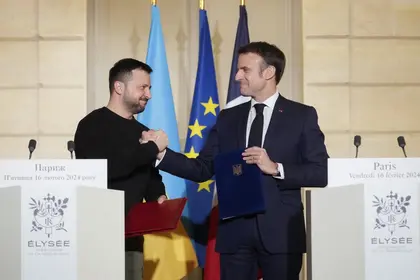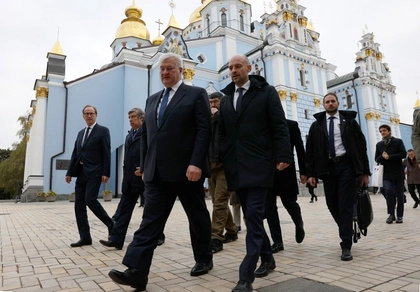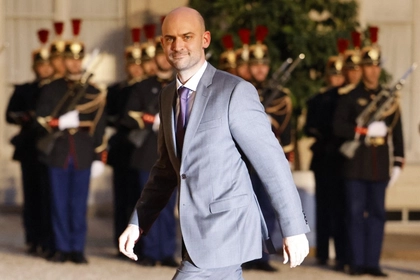Germany and France on Friday both signed bilateral security agreements with Ukraine, a stop-gap solution for Kyiv while it waits in hope of someday joining the NATO defense alliance.
The two new pacts follow a similar deal with the British in January and come as Ukrainian troops face a challenging situation on the battlefield almost two years after the Russian invasion.
JOIN US ON TELEGRAM
Follow our coverage of the war on the @Kyivpost_official.
All three agreements deal with both current military support for Ukraine and its future defense against Russia. Here are five things to know on agreements Ukrainian President Volodymyr Zelensky described as "truly unprecedented":
- Broad deals -
Britain was first to make good on a commitment made by G7 countries on the fringes of a NATO summit in Vilnius last year to sign bilateral security agreements with Ukraine.
The text of the accord covers everything from the supply of weapons to the training of troops, strengthening cybersecurity and the domestic defense industry.
The German agreement covers much the same ground as the British deal, including a mechanism to be triggered in case of another future Russian attack on Ukraine.
In that case, Kyiv, Berlin and other capitals would enter into consultations within 24 hours of the attack being launched.
In all, 25 other countries, going well beyond the G7, have said they will sign such agreements. G7 members Italy and Japan are said to be close, while agreements with Sweden and Norway are also moving forward.
![[VIDEOS] North Korean Troops in Russia Confirmed](https://static.kyivpost.com/storage/2024/10/19/a6f6a4c5d74d066019e5812a20c6514f.png?w=420&q=75&f=webp)
[VIDEOS] North Korean Troops in Russia Confirmed
- NATO worries -
With NATO accession still looking far off, Ukraine will have to content itself with the bilateral agreements with three alliance members.
But the transatlantic defence pact is not looking as solid after former US president Donald Trump, who is again running for office, called into question the United States' commitment to the alliance.
On the campaign trail, Trump threatened to abandon any alliance members who did not meet defence spending commitments to attack.
The speed with which new bilateral agreements are being signed could "signal that Ukraine, and indeed several of European countries, are increasingly concerned about Trump winning the election in November and possibly deciding to withdraw from NATO", said Colin Clarke, head of research at the Soufan Center, a New York global security think tank.
- Alternative for Kyiv -
Ukraine's accession to the alliance is as wanted in Kyiv as it is divisive in NATO capitals, said Ivan Klyszcz from the International Centre for Defence and Security in Estonia.
But membership in the alliance was still "not on the cards as Ukraine was not invited to join," Klyszcz told AFP.
In the meantime, the accords can send an important message, he said.
"To Ukraine, it signals commitment. To Russia, it signals resolve to Ukraine’s survival, especially beyond electoral cycles."
- Bilateral bonus -
Ukrainian efforts to quickly join the European Union look likely to fall foul of the same issue as NATO: a lack of agreement between the member states.
Bilateral accords offer an alternative to sometimes messy multilateral agreements, where single members can wield a veto and hold up progress, according to Pierre Razoux from the Mediterranean Foundation of Strategic Studies in France.
"A bilateral tie might seem more fragile but it is psychologically and politically harder to call into question, especially when there are arms contracts involved," Razoux said.
Ultimately, countries can build webs with many "security ties" that can be more "a la carte" than cumbersome multilateral accords.
- Test to come -
Whether the bilateral agreements signed by Ukraine hold up is yet to be seen.
The accords are not much more than a declaration of intention, according to Sascha Ostanina from the Jacques Delors Institute in Berlin.
"If the political will disappears, there are no strong enforceability mechanisms to prevent breaking the agreement," she said.
In the case of the deal between Germany and Ukraine, the two sides can repudiated the deal with six months notice, with only "some reputational risks attached to such a decision, but they are likely to be limited and short-term."
You can also highlight the text and press Ctrl + Enter






